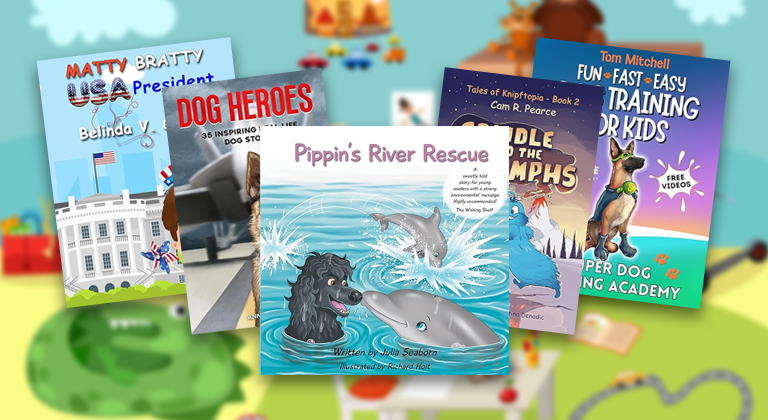Is Kindle Unlimited worth it in 2023?
While some authors publish wide across multiple online storefronts, there are a great many others that are exclusive to Amazon due to their KDP Select enrollment terms. As part of that enrollment, their books are available to readers with a Kindle Unlimited (KU) subscription, and the authors are paid per pages read from a common pool of money. But as KU Page Reads hit their lowest payout ever this past July, those same authors may be asking themselves “Is Kindle Unlimited worth it in 2023?”
That’s exactly the question that Ginger is looking to answer this week, as he examines the pros and cons of remaining in KU as the main benefit to authors continues to fall, month over month. There may not be a single answer that applies to everyone, but knowing the facts can help make an informed decision for anyone still on the fence, or simply deciding whether it’s time to make a change.
In July 2023, Kindle Direct Publishing’s payout rate for KENP page reads reached its lowest level ever – just $0.003989. That’s over 30% less than the highest payout recorded, in October 2015.
This precipitous drop in royalties has many authors asking a very familiar question: Is keeping your books in Kindle Unlimited even worth it any longer? In this article, I’ll cover the pros and cons of remaining part of Kindle Select as it stands in September 2023.
Wait – how does Kindle Unlimited pay authors again?
When an author self-publishes a book using the Kindle Direct Publishing platform, one of the most important questions they’ll have to ask themselves is whether or not to tick the box that makes their book part of Kindle Select – allowing Amazon shoppers with a Kindle Unlimited subscription to download and read their book “for free.”
The book won’t actually be “free” of course. The reader’s monthly Kindle Unlimited fee gets added to the KDP Global Fund, and Amazon pays authors a percentage of that fund each month based on how much of their eligible books have been read. So essentially, the KDP Global Fund is a pool of all the Kindle Unlimited subscription payments (minus Amazon’s cut, of course) divided among all the billions of pages read that month.
In July 2023, for example, the KDP Global Fund was $49.5 million dollars. With a per-page payout of $0.003989, that means Kindle Unlimited subscribers read approximately 12.4 billion pages that month.
Amazon provides a few benefits for making your books part of Kindle Unlimited. For a start, there’s access to that global pool of funds each month. For certain authors in certain niches – romance, for example – this is a huge opportunity, and many romance authors make 50% of their monthly revenue, or more, through KDP Select page reads.
Additionally, Amazon provides the opportunity to give your book away for free for 5 days every subscription period – a once-powerful marketing tool that I’ve previously argued has lost its effectiveness. You can alternatively take advantage of a Kindle Countdown Deal, which offers your book at a steadily-decreasing discount, urging readers to buy it before the deal runs out.
Finally, there’s the additional organic marketing and visibility that Amazon gives to books that are part of Kindle Unlimited; maximizing reader awareness amid all the paid-for advertising spots on Amazon’s homepages.
But there’s a condition attached. To take advantage of all the benefits of KDP Select, the eBooks that you make part of Kindle Unlimited have to remain exclusive to Amazon for that 90-day period – you can’t have them for sale through Apple Books, Barnes & Noble, or any other retailer.
I’m one of many authors who thinks there are benefits to remaining part of Kindle Unlimited, so all my books are available via KU through the Amazon platform – and only that platform.
However, there’s a very vocal group of authors who believe authors should “go wide for the win” and many of them are earning the kind of royalties that prove the merits of that approach.
Craig and I even discussed this opinion at length with the owner of the influential “Wide for the Win” Facebook group, Erin Wright, in one of the earliest episodes of the Fully Booked podcast (and a couple of times after that, as well).
But given the changing landscape of self-publishing, it’s not a black and white question to answer. Changes in the industry offer both new challenges and new opportunities for authors choosing to go wide, or remain part of Kindle Unlimited. Here are some of the biggest changes I’ve come aware of recently.
Pros
There’s one fact about keeping your books part of Kindle Unlimited that the “Wide for the Win” crowd often ignores, and that’s the amount of money involved.
In July 2023, the KDP Global Fund was $49.5 million dollars – the highest it’s ever been. In 2022, Amazon paid authors over $522 million in royalties. It’s clear that there’s still a ton of opportunity in Kindle Unlimited for authors who write in a genre that’s popular in KU and know how to reach readers with Kindle Unlimited subscriptions.
As of September 2023, there’s another massive advantage to keeping your books part of Kindle Unlimited – the fact that Google and Apple charge such exorbitant fees for transactions on their mobile platforms that Amazon have removed the ability to buy Kindle ebooks on the Amazon app.
Over 97% of Facebook users access the platform on their mobile device, which has made advertising eBooks incredibly difficult. Each click you pay for drives a user to your book’s product page on Amazon – but often, they can’t buy the book! There’s no simple solution to this problem except for making your book part of Kindle Unlimited, since for these readers, clicking on the “Read for Free with Kindle Unlimited” button is the only guaranteed way to earn revenue from your advertising budget right now (at least in that scenario)!
These advantages compound one of the other plus-points for being part of KDP Select – simplicity. Publishing wide – especially if you want to make money – involves a lot more work than putting all your eggs in the Amazon basket. Many authors who’ve found success with Kindle Unlimited value the time and mental effort they save by only having to sell on the Amazon platform – something that outweighs a lot of the revenue they might otherwise be making by selling on platforms like Apple Books and Smashwords.
Cons
Of course, nothing is won without sacrifice – and as of September 2023, there are several opportunities authors have to sacrifice in order to keep their books in Kindle Unlimited.
The first and most significant is the opportunity to sell your books on platforms beyond just Amazon. As of writing this, the biggest platform authors are missing out on is Apple books.
In the United States, more than 57% of mobile users are on the iPhone platform – which comes with Apple Books baked into the operating system. Authors who drive their ads to Apple books rather than Amazon overcome the major hurdle holding writers back right now – the inability to buy eBooks on mobile devices.
Similarly, there are a lot of authors experimenting with selling their eBooks directly to readers, using their own website and a transaction platform like Shopify. Once again, you can’t use this approach if your books are in Kindle Unlimited as they have to be exclusive to Amazon for each 90-day subscription period – but for those selling “wide” it’s an opportunity to bypass the roadblock that Google and Apple have created for those of us previously limited to selling on Amazon.
A third disadvantage of remaining in Kindle Unlimited is just how much revenues have dropped in recent months – and how that drop shows no sign of reversing. July 2023 might have had the lowest per-page payout in the history of Kindle Unlimited, but it was merely the lowest payout yet. For over a year now, page read payouts have been shrinking incrementally and the influx of AI-generated garbage being allowed onto the Kindle platform is driving that decline even faster.
Writing a book hasn’t become any easier since 2015 – yet in 2023 authors are being paid 30% less for them through Kindle Unlimited.
These factors combine to make a pretty compelling argument against remaining in Kindle Unlimited – but it’s still far from a no-brainer for most authors.
Conclusion
While I’ve outlined where we stand in terms of Kindle Unlimited in September 2023, like everything with a date attached to it, the situation is bound to change.
Amazon remains committed to the Kindle Unlimited subscription program and the fact that July 2023 was the biggest month ever for the KDP Global Fund suggests that KU subscribers are similarly committed. Whatever happens, Kindle Unlimited will continue to grow – and if Amazon is able to crack down on abusive users and AI generated books, that means opportunities for authors who keep their books in KU might also grow.
But it’s very far from certain – and authors looking to build a sustainable publishing business that isn’t reliant on the whims of tech giants are continuing to lean more heavily towards publishing wide, or direct-selling to their readers.
For the moment, I’m going to stick with KU – but I’d love to know your thoughts about where you think the future of digital publishing will take us. Are you going to keep your books in Kindle Unlimited? Or has Amazon already lost the opportunity to keep your books exclusive? Let us know in the comments section below!












I admit I started out with KU but I went wide after a while. Personally, I wanted to be able to sell ebooks on my own site if I wanted to.Facebook is not the best place to market your book, but I have found it to be the best place to promote yourself to do group promos and to pull people to your list. My list is way more important to me than any following on any social media or platform. If KU were to disappear tomorrow…
I am a first time author of a poetry book through KDP & I am ok with that. I do appreciate the info, because I didn’t know that if you are with KU and Amazon that you cannot be on other platforms. I thought that it was included in the package for marketing. My book was published on February 17, hasn’t been a month yet. I do have over 5.2k followers on FB and over 2k on IG, I was wondering what is an amazing book sale amount for the first 90 days, & what other social media platforms do I need to engage in? I am 46 years old and not very computer savvy…
It is not worth it especially when you loose books in the middle of reading them
It really depends on the writer too, to be honest. First time publishing your first book? 100% go KU, your likelihood of making a living off of a single book is close to winning the lottery. I published my first book wide around 2015, and I think I got a single purchase from Barnes and Noble, none on Kodo or others, and several hundred on Amazon. My second book I kept exclusive to Amazon and I focused my marketing there, getting a top ten listing. My third…eh, didn’t do as well (different target audience), sold only about a hundred or so copies, even though I went wide. Marketing for people without a following is a huge deal, because no one knows whether to pick up their titles or not. TL;DR: wide is better if you’re known. KU is better if you’re trying to get known.
For me, KU is a better alternative than wide. Neither is perfect but as someone who was wide for some years, I at least have some experience. A lot of authors who complain about KU have no idea how hard it is to sell wide. People act like you can just leave KU and then put your books wide and magically start making money where they left off. Ha! No. Wide is a completely different world. I was wide for years AND had Bookbubs and still, you’d gain a little traction and then it disappeared. It’s a neverending cycle of trying to hang onto every little sale.
For some authors, wide does well. Especially if you are an International author with International readers or someone who writes obscure books like things with a lot of mixed genres or you write in a teeny tiny genre where the audience isn’t that voracious. But for many who write books catering to the US audience and who write main genre stuff like romance, thrillers, sci-fi, and fantasy, KU most likely is the best bet for those types of books. It just is and many authors who preach “going wide” have never even been wide.
Let’s be real. Yeah, we saw all the whining from authors who were upset that the payout went down in KU but how many really left? I’d say probably less than 10% if that many actually left KU. Know how I know? Because this happens all the time. Every time authors get upset with Amazon or the payout goes down they threaten to leave and most never, ever do. I don’t know why they feel the need to announce on social media they are “leaving KU” despite lying about it but still, why announce? Why not just leave? I don’t get the public whining that some authors in KU do about their dislike for KU. If you don’t like KU and feel you can do better wide than leave. Amazon does not need anyone who does not want to stay and KU readers will be fine.
But you can’t have your cake and eat it too. You can’t leave KU and expect KU readers to follow you. No. KU readers are loyal to the program and only a tiny bit to the authors. That doesn’t bother me at all as an author. I’m about moving books. I don’t care how or when. I don’t care about readers following me place-to-place as long as where I am at at the time is working. But, yeah some KU authors wanna leave KU then guilt-trip readers into leaving. Authors have no business griping about their business issues in public. It is so unprofessional. But I am so sick of authors acting like babies whenever Amazon does something they don’t like, threatening to leave KU, but never do. As an author in KU, I am glad every time I hear authors claiming they want to leave because the less authors who leave, the higher the payout for the ones who stay. But that’s how you know it’s just BS. These authors just want attention. They wanna holler and scream but they’re not going anywhere. I’ve seen the same authors claim they are leaving KU and never do. And the ones who do leave come back to KU with their tails between their legs when they see how incredibly difficult it is moving units wide.
So I ignore the “noise” of those who claim they are leaving KU. Check their books and every time they are sitting up in KU still and always will be.
My thing is, don’t make business decisions when you are emotional. You can’t have a bad month in KU then just jump up with no plan and take your books wide and think that is the answer. But so many fall into that trap of blaming the retailer or the way they publish and not taking ownership.
How about we look at that? When your books aren’t selling in KU, how come it just can’t be the books? KU is highly competitive and maybe your books aren’t cutting it. It could be bad packaging, bad branding, bad cover or cover that doesn’t fit the audience’s expectation, bad blurb, bad title, bad writing. How come it’s NEVER any of that? It’s always someone else’s fault why someone didn’t do well in KU. Is KU perfect? Heck no! But wide sure as heck isn’t either and I would rather be making money so I stick with KU. I welcome anyone who thinks wide is better (but hasn’t tried it yet) to put their money where their mouth is literally and go wide. Don’t just claim you will or complain when your KU money goes south. Go on and go!
But authors tend to always blame other factors for why their stuff isn’t selling. Yes, sometimes it is things out of your control but many times it’s not. A lot of times when I see authors complaining about not doing well in KU, you go see their books and they’re either writing stuff with too small of a market or the books need work. Almost every single time. Instead of addressing these issues they stomp their feet like two-year-olds and go, “I’m going wide!” As if someone cares first of all but if you got a bad product going wide is not going to help you. I gotta be honest and not trying to be mean but if you write in a genre that does well in KU and you can’t make any money there most likely there is a problem with your books. Authors need to look in the mirror more and stop using KU as a scapegoat for when they don’t do well in the program.
As for the payout. It makes no sense to whine. You knew what you were signing up for. Authors know the money relies on a POT that everyone shares. How can you be in KU for years and not have an issue with that now suddenly it’s an issue because the payout went down. And the payout goes up and down. It doesn’t stay the same rate.
A lot of authors aren’t cut out to be business people. They are too emotional, have too high of expectations, and are unrealistic. I don’t care if you usually have good months in KU and things went south. So? That’s life. Unless you work at a job with a salary, you cannot expect to make the same amount or better every month. You are going to have slower months. You are going to have good months. That’s how bookselling goes. Has nothing to do with KU or the payout. So I get tired of authors blaming their failures on KU.
For many KU authors, it’s a case of “thinking the grass is greener on the other side”. It might be for a small few but why do you think KU has more authors than the other places combined? Why do you think KU has more READERS than the others combined? People can talk all day about Apple, Kobo, B&N but it doesn’t matter if you got a fraction of the readers there that you have in Amazon! You are fighting for a much smaller pie. Apple doesn’t have HALF the amount of readers Amazon has. Not by a longshot. It’s a reason authors stick with KU even if they wish they didn’t have to, because for many it’s the only true game in town. The only way they can make money.
Everyone isn’t privileged enough to be able to just go wide and wait months or a year before they get traction. Some of us need money monthly. Some support their families off what they make in KU. Those who are in a better financial situation either it’s by someone supporting them or whatever, they can afford to just throw caution to the wind and go wide! But it’s not a luxury every author can afford. Many in KU make better money in a month than they ever would wide in two years. It’s no surprise they stick with KU and that the few that leave end up coming back.
Also, the “eggs in one basket” argument is a joke. I was wide and had my books in many baskets for years and I made more in that one Amazon basket in a week sometimes than I made on Apple or Kobo for two months! So miss me with the “eggs in one basket.” I don’t care if that basket is making money. And for those who leave KU because they are worried about losing their accounts, think of this. If you make the bulk of your money in Amazon and lose your account wide, you think you are in a better place? Doesn’t matter if you are wide and make 90% on Amazon which most wide authors do. So going wide does not protect you if you lose your KDP account. Many wide authors have lost their accounts and end up crying their eyes out. Why? Because they don’t make a fraction at the other places they make on Amazon so they are screwed either way.
People need to realize that. Both of these “reasons” for leaving KU make no sense. Leave KU if you genuinely want to and have a plan for wide. Don’t just throw a hissy fit because you get ticked off at Amazon then snatch your books off and go wide with no plan. You’re only hurting yourself.
But, yeah I wanna see more authors practicing what they preach and actually leaving KU. Haven’t seen this mass exodus yet. Not in all the years KU has been around.
I’m guessing we never will.
ummm… I think Jeff Bezos has infiltrated the comment section. This is a hissy fit 🤣
About 2 years ago, I removed all my middle grade books from KU due to shrinking page reads and payments. I also have a three (soon to be four) series of clean romance under my pen name of K.T. Raine. That’s supposed to be a genre that does great in KU. But despite great reviews and lots of promotion, I always struggled to get page reads. Plus, my titles run around 55,000 words, so even a full read through only brought in about $1.28. A survey of my email list showed me that a significant amount of my subscribers purchased books on other platforms, not just Amazon. I took the series wide a few months back. I’m making slowly increasing sales on Apple, B&N and surprisingly, Hoopla. I will be starting a new series soon and have no plans to return to KU.
I, too, was wide for many years. I had a bookbub on a book that that hadn’t been selling well and was in a tiktok workshop and the guy said, why isn’t this in KU. So I pulled everything (but that book because it was doing well on B&N still). The page reads went crazy on my most popular series Regency Rebel Lords. And I’m still doing better in KU than I did wide. It has slowed this week, but there are other factors of my own doing that hurt, so I’m back to grind on marketing. But for now, I’m sticking with KU.